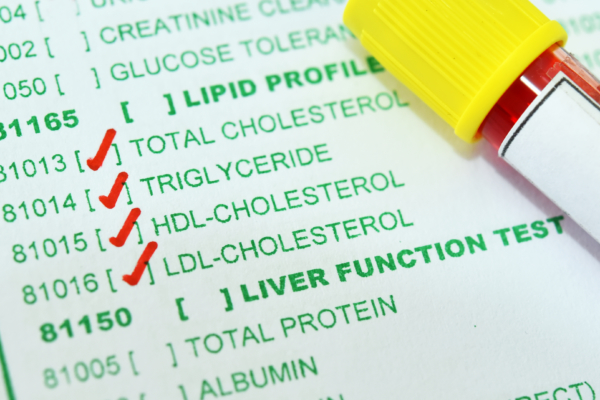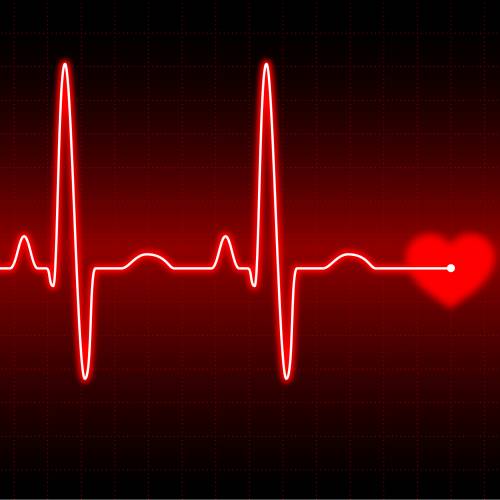The circulatory system, or Cardiovascular system, is made up of your heart and blood vessels. There are many circulatory conditions which can affect our circulatory system, such as high blood pressure, heart attack, heart failure, and coronary heart disease. These conditions may also be called Cardiovascular diseases (or CVD for short).
185,554 people are living with circulatory conditions, with 11 deaths every day due to circulatory diseases. Coronary Heart Disease is the biggest single cause of premature deaths (in people younger than 75) across NI. With your help, we can take the fight to these diseases. In the last eight years alone, your donations have allowed us to give over £1 million to research to tackle these conditions.
Read more below about some of the heart research that we fund, with your help.

Research you fund could help develop a high street test that detects heart disease.
An important aim of preventing illness is being able to predict a person’s risk or likelihood of developing a disease. This is also true when we are trying to prevent heart disease.
Normally, when assessing the health of a person’s heart and blood vessels, specialist staff and equipment, and sometimes surgery, are required. What if we could assess your risk without the cost of these specialists, without surgery, special dyes and x-rays, or inserting tubes into your veins? The eye, with its many blood vessels, might offer a cheaper and more accessible way of examining the health of our hearts.
With your help, Professor Moore and her team are exploring this. The “Eye as a Window” team have already built tech that uses a photograph of the blood vessels in the eye to assess risk. The team now plan to test how well their tech predicts the risk of developing heart disease in a large group of people from across Northern Ireland.
At the moment, there is no such tech. This is a first of its kind study. The ultimate aim is to have this technology in every High Street eye testing store. Predicting your chances of developing these diseases early, means that you can get treatment and support earlier, hopefully improving your chances of recovery, and reducing the terrible impact of untreated heart disease for all of us.
Research you fund could show that a simple herb could be vital in the fight against heart disease
Hyperlipidaemia means your blood has too many lipids (or fats). The condition can affect one fat protein, like cholesterol, or several. Most people will have no symptoms, but having hyperlipidemia increases the risk of developing heart disease.
Fenugreek is a herb used in cooking, and has a long history of use in medicine in India and China. In recent years, researchers have begun studying its health promoting properties.
Thanks to you, we were able to fund Dr Qiaozhu Su and her team, at Queen’s University Belfast, to test whether Fenugreek seed could be used to treat Hyperlipidemia and cardiovascular disease in place of current drugs, such as statins, which sometimes cause side effects.
This is the first study to test fenugreek on patients with hyperlipidaemia without diabetes in NI. We hope it will provide evidence that fenugreek seed can be used in treating and preventing these conditions.
Because fenugreek seed has been used as a spice for thousands of years, we know it is safe to include it in the diet or as a supplement. This will probably be cheaper than providing drugs like statins. It will also avoid any adverse side effects caused by these drugs. Successfully treating Hyperlipidemia will reduce the number of people living with CVD. This will improve the lives of many people, and help prevent deaths due to these conditions.

Research you fund could lead to the development of a blood test for stroke and heart failure.
Cardiac arrhythmia is an abnormal heart rhythm, where the heart beats too fast, too slow or irregularly. It can contribute to serious complications such as stroke or heart failure.
Detecting arrhythmia early and assessing risk of stroke or heart failure could help prevent long term damage to the heart. Under stress, the heart will release small molecules – called proteins - into the blood. These can be used to detect complications of the heart.
Thanks to your donations, we have funded Dr. Chris Watson and his team, at Queen’s University Belfast, to compare proteins found in the blood of people with cardiac arrhythmia, and those without. They aim to see whether a blood test can be used to predict risk of stroke or heart failure early.
Developing a blood test would reduce the risk of developing long term, life threatening conditions, among people living with cardiac arrhythmia.
Research you fund has shown that a vitamin supplement can help people manage their high blood pressure.
Blood pressure is the pressure of blood in your arteries. High blood pressure (also called "hypertension") is a medical condition. It means your blood pressure is consistently too high and your heart has to work harder to pump blood around your body. If left untreated, it increases your risk of serious problems such as heart attacks and strokes.
Riboflavin is also called Vitamin B2. It helps break down proteins, fats, and carbohydrates. It plays a vital role in maintaining the body's energy supply. It is found naturally in foods like eggs, milk, some meats. It is also added to food, like cereals.
Over a quarter of a million people in Northern Ireland are on the hypertension register. Some genetic factors have been found to be a risk for hypertension. About one in ten people across Northern Ireland have a set of genes called the 677TT genotype, that leaves them at greater risk of hypertension.
A team of researchers, led by Prof Mary Ward at the Ulster University, have been investigating the effect that Vitamin B2 (called Riboflavin) has on this group of people’s blood pressure. They believe that B2 can be used to help manage hypertension. This is important because hypertension is a leading cause of coronary heart disease and stroke.
Thanks to your help, research like this helps to establish whether Riboflavin alone or in combination with anti-hypertensive drugs could offer a safe, inexpensive and effective treatment for high blood pressure in this group. This would reduce their risk for developing deadly diseases such as coronary heart disease and stroke.
Research you fund will help our children become more physically active.
Children living in Northern Ireland are the least active in the UK, with only about 4 in 10 children meeting current recommended levels for physical activity. The increase in sedentary ("inactive") behaviour starts young, probably at 8-9 years old, and then continues into adulthood. A sedentary lifestyle is strongly linked to poor health, including CVD.
With your help, we are tackling this head on. We funded Sarah Nally, a PhD student at the Ulster University, with the help of her supervisors - Professor Marie Murphy and Professor Alison Gallagher - to develop a low-cost, physical activity scheme that could be delivered to 7-11 year olds in schools across Northern Ireland.
The researchers are taking a model already proven to be effective in Australia, modifying it to suit our schools, and testing how effective it is (using a small number of schools).
If the team can successfully develop their programme, then we hope it could be offered across the whole country. Not only would this improve the health of our school children, but it would improve their chances of being healthy as they become teens and adults. This in turn, would help reduce the risk and costs associated with circulatory diseases.

